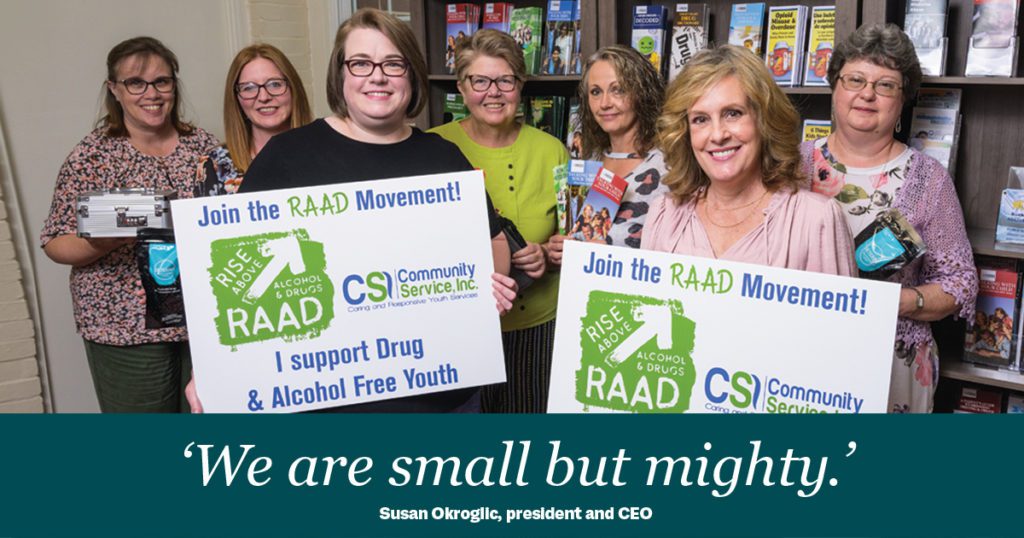07 Aug 2023 Agency works to stop drugs, alcohol usage in youth
By Carol Rolf
According to an old adage attributed to Benjamin Franklin, “An ounce of prevention is worth a pound of cure.” The administrators at Community Service Inc. (CSI) in Morrilton would surely agree.
“Our mission is to be a leader in providing quality services to youth and their families that will empower them to attain success in their homes, schools, careers and communities,” said Susan Okroglic, president and CEO. The nonprofit is a community-based youth service provider founded in 1958 in Conway County.

CSI is committed to helping youth ages 4 to 19 through prevention and education, therapeutic foster care, day treatment, substance abuse services, mental health services and juvenile justice, according to Okroglic. The agency serves 23 counties at 16 locations throughout Arkansas and provides prevention services to eight more. They employ 90-100 people statewide and operate on a tight annual budget of $8.5 million. “We served about 2,000 clients last year, but our prevention team often reaches tens of thousands through their community events, etc.,” she said.
“Our founders’ goal was to ‘combat juvenile delinquency,’ but that also included addressing other needs, such as the physical needs of the family, school supplies and medicine,” Okroglic said. Over time, addressing mental health care has become one of their main goals.
“We speak with parents, go into schools addressing ways to prevent, and look for signs of drug and/or alcohol misuse,” said Shannon Cook, director of Prevention Services. “We go to senior centers, community groups, health care fairs, child safety fairs — anywhere we can — telling people to lock up their medicines, know what they are taking and don’t share medicines with others.”
Cook said they want to reach young people before they smoke their first cigarette, take their first drink of alcohol or try another drug such as marijuana or methamphetamine (meth).
The average age of a young person in Arkansas who starts smoking or using alcohol is 12, Cook said. “Our goal is to get to those young people before they start,” she said. “We also want to let the parents know about the long-term effects of smoking and drinking.
Arkansas spends more than $1.4 billion on health care annually because of smoking (tobaccofreekids.org), which includes vaping and smoking marijuana. “If we can do anything to prevent them from smoking or drinking, we’re coming out a winner,” Cook said.
She also believes that meth is the principal drug threat in Arkansas. “Meth is not like it used to be when people cooked it in their backyard,” she said. “It’s coming across the border (from Mexico) in droves. It’s sometimes mixed with other drugs, which can make it fatal if taken. And it’s easy for young people, and others, to get.
CSI has joined a new statewide initiative called Me Over Meth, which is sponsored by the Arkansas Department of Human Services Division of Aging, Adult and Behavioral Health Services (DAABHS) to raise awareness, Cook said, adding that ads have been appearing in local publications. “The prevention campaign is aimed at building community capacity to eradicate methamphetamine in our state.”
More information on Me Over Meth can be found at meovermeth.org.
Okroglic said she became involved with CSI for a personal reason. “My dad smoked for many years,” she said. “He died in 2017 from complications from smoking. “I am a social worker with a bachelor’s degree in rehabilitation science from Arkansas Tech University, a master’s degree in social work from the University of Arkansas at Little Rock and a doctorate in social work from the University of Tennessee at Knoxville,” she said. “I came to work here in prevention services in 2002. I became CEO in 2016.”
Cook has been with CSI for eight years. She has a bachelor’s and a master’s degree in sociology, both from the University of Central Arkansas.
Okroglic said clients come to CSI through several avenues. “Clients can be referred to us through the courts,” she said. “They also come to us by word of mouth, by referrals from schools or they can just walk in. When they come to us, we take some demographic information, including ID cards, and schedule a time with a therapist for an assessment.
“We are small but mighty,” she said. “Our goal is to treat or intervene … with both kids and their parents. It’s been really stressful for kids and their families post-COVID-19. We are here to help.”
For more information on Community Service Inc., call 501.354.4589 or visit the website CSIYouth.com.











